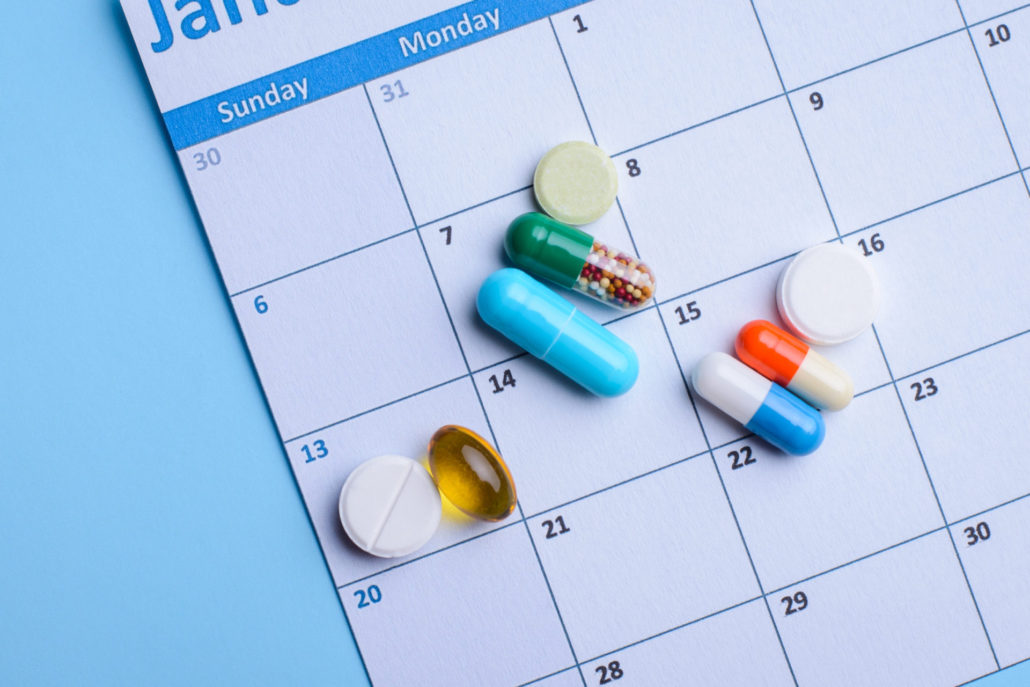Medication synchronization is a service that lets you pick up all your prescription drugs on the same day each month. Instead of making different trips to the pharmacy, you get everything at once.
This simple idea helps millions of Americans take their medications better. It also saves time, money, and helps people stay healthier. Let’s explore how this works and why it might be perfect for you.
How Does Medication Synchronization Work?
Think of medication synchronization like getting all your bills on the same day each month. Your pharmacist lines up all your refills so they’re ready together.
Here’s what happens:
Your pharmacist looks at all your medications and picks one day each month for pickup. They might give you partial refills at first to get everything on the same schedule. Once everything is lined up, all your medications are ready on your chosen day.
The pharmacist calls you before your pickup day to review your medications. They ask if you need any changes or have questions. On pickup day, you get everything at once – usually a 30-day supply of each medication.
The Process Step by Step
First, you talk to your pharmacist about joining the program. They review all your medications and health conditions. Together, you pick the best day each month for pickup.
Next, your pharmacist adjusts your refill dates. Some medications might need partial fills to get on schedule. This is normal and helps sync everything up.
Finally, you get into your new routine. One day each month, you pick up all your medications. Your pharmacist is there to answer questions and help you stay on track.
Key Benefits of Medication Synchronization
The biggest benefit is better medication adherence. Research shows that patients in med sync programs are 2.3 times more likely to stick to their medications. This is huge for people with chronic conditions like diabetes or heart disease.
Poor medication adherence costs the U.S. health system $100 to $300 billion each year, according to the CDC. When people take their medications correctly, everyone saves money.
Better Health Outcomes
Taking medications as prescribed leads to better health. Studies show that patients in medication synchronization programs have 9% fewer hospital visits and 3% fewer emergency room visits.
People with heart disease, diabetes, and high blood pressure see the biggest improvements. Their conditions are better controlled when they don’t skip doses.
Save Time and Money
Instead of making multiple pharmacy trips, you make just one each month. This saves gas, time, and parking fees. For busy parents or people with mobility issues, this is a game-changer.
You also save money by not missing doses. When you skip medications, your health can get worse. This leads to more doctor visits and hospital stays.
Less Stress and Worry
Keeping track of different refill dates is stressful. With medication synchronization, you only remember one date each month. Many people say this takes a big weight off their shoulders.
You also get personalized attention from your pharmacist. They can catch problems early and help you manage side effects or drug interactions.
Who Should Consider Medication Synchronization?
Medication synchronization works best for people taking two or more ongoing medications. If you have chronic conditions like diabetes, heart disease, or high blood pressure, it’s especially helpful.
You might benefit if you:
- Take multiple medications for different conditions
- Forget to pick up prescriptions
- Make frequent trips to the pharmacy
- Have trouble getting to the pharmacy
- Want better control of your health conditions
People Who See the Most Benefits
Studies show that people with lower medication adherence at the start see the biggest improvements. If you sometimes forget medications or skip doses, this program can really help.
Older adults often love medication synchronization. Managing multiple prescriptions gets easier with age, and this service reduces confusion.
Caregivers also find it helpful. Instead of tracking different medications for their loved ones, they have one pickup day to remember.
How to Get Started With Medication Synchronization
Most pharmacies offer medication synchronization for free. Start by talking to your pharmacist about the program. They’ll explain how it works at their location.
Bring a list of all your medications, including over-the-counter drugs and supplements. Your pharmacist needs to see the full picture of what you take.
Questions to Ask Your Pharmacist
When you meet with your pharmacist, ask these questions:
- Which medications can be synchronized?
- What day works best for monthly pickup?
- Will my insurance cover partial fills?
- How do you handle prescription changes?
- Can I get reminders before pickup day?
Setting Up Your Schedule
Pick a pickup day that works with your schedule. Many people choose the first or fifteenth of each month. Some prefer to align with payday or other regular appointments.
Your pharmacist will work with your insurance to make sure partial fills are covered. Most insurance plans support medication synchronization programs.
Common Questions About Medication Synchronization
Does Insurance Cover It?
Yes, most insurance plans cover medication synchronization. Medicare Part D requires coverage of partial fills for medication synchronization. Many states also require private insurance to cover it.
Your co-pays stay the same. If you normally pay $10 for a prescription, you’ll still pay $10 even with partial fills.
What If I Miss My Pickup Day?
If you miss your pickup day, don’t worry. Your medications will be ready when you arrive. Most pharmacies hold synchronized prescriptions for several days.
Call your pharmacy if you know you’ll be late. They can often hold your medications longer or make special arrangements.
Can I Travel While in the Program?
Yes, you can travel while using medication synchronization. Talk to your pharmacist about getting early refills for trips. Most insurance plans allow this for travel.
You can also transfer your prescriptions to a pharmacy at your destination if needed. Your home pharmacy can help arrange this.
Cost Benefits of Better Medication Adherence
Medication nonadherence is associated with 125,000 deaths annually and at least 10% of hospitalizations. When people take their medications correctly, they stay out of the hospital more often.
One study found that patients in medication synchronization programs had a 7.5% increase in adherence over 4 months. Even small improvements in taking medications lead to big health benefits.
Personal Financial Benefits
Better medication adherence means fewer doctor visits and hospital stays. This saves money on medical bills and time off work.
Studies show that eliminating co-pays for chronic disease medications led to $63 per month savings in total healthcare costs. When people take their medications regularly, they need less overall medical care.
System-Wide Savings
When more people take their medications correctly, the whole healthcare system saves money. Fewer emergency room visits and hospital stays mean resources can be used for other patients.
Improving medication adherence could save at least $140 billion in healthcare costs. This is money that can be used for research, new treatments, and better patient care.
Technology and Medication Synchronization
Many pharmacies use technology to make medication synchronization even better. Automated systems track your medications and send reminders.
Some pharmacies offer apps that let you manage your medications from your phone. You can see when prescriptions are ready and get notifications about pickup days.
Automated Reminders
Most medication synchronization programs include automated reminders. You might get:
- Phone calls before pickup day
- Text messages with pickup reminders
- Email notifications about prescription status
- App notifications on your smartphone
These reminders help you never miss a pickup day. They’re especially helpful if you’re busy or have memory concerns.
Integration with Health Records
Some pharmacies connect with your doctor’s electronic health records. This helps your healthcare team know if you’re taking medications correctly.
Your doctor can see if you’re picking up prescriptions on time. This helps them make better decisions about your care.
Real-World Success Stories
The National Community Pharmacists Association found that medication synchronization programs boost patient adherence rates by more than 30%. This means about one in three people who join these programs take their medications much more consistently.
An estimated 1.5 million patients are currently enrolled in medication synchronization programs across the United States. The number keeps growing as more people discover the benefits.
Impact on Different Conditions
People with different health conditions see different benefits from medication synchronization:
Diabetes patients often see better blood sugar control. When they take their medications consistently, their A1C levels improve.
Heart disease patients have fewer heart attacks and strokes. Blood pressure and cholesterol medications work better when taken every day.
Depression patients report feeling better more consistently. Antidepressants need to be taken regularly to work properly.
Choosing the Right Pharmacy for Medication Synchronization
Not all pharmacies offer the same level of medication synchronization services. When choosing a pharmacy, look for these features:
Personalized service – The pharmacist should know your name and health conditions. They should be available to answer questions and provide counseling.
Technology support – Good programs include automated reminders and easy ways to contact the pharmacy.
Insurance expertise – The pharmacy should understand your insurance benefits and help you save money.
Convenient hours – Pick a pharmacy with hours that work with your schedule.
Local vs. Chain Pharmacies
Both local and chain pharmacies can offer excellent medication synchronization services. Studies show that about 10% of independent pharmacies and 6% of chain pharmacies offer medication synchronization.
Local pharmacies often provide more personal service. You’ll work with the same pharmacist each time, and they’ll know your specific needs.
Chain pharmacies might offer more technology features. They often have apps and online services that make managing medications easier.
For residents in Park City and surrounding areas, Greenleaf Pharmacy offers comprehensive medication synchronization services. They provide personalized care with the convenience of modern technology, including medication counseling and prescription management.
The Future of Medication Synchronization
Medication synchronization is becoming more popular as healthcare focuses on preventing problems rather than just treating them. Despite the benefits, only one in five independent pharmacies currently offer medication synchronization. This number is expected to grow rapidly.
New technology is making medication synchronization even better. Artificial intelligence helps predict which patients might benefit most from the service. Smart pill bottles can track when medications are taken.
Integration with Telehealth
As telehealth becomes more common, medication synchronization fits perfectly. Patients can have video appointments with pharmacists on pickup days. This provides extra support without requiring additional trips.
Remote monitoring devices can track how well medications are working. This information helps pharmacists and doctors make better treatment decisions.
Expanding to More Medications
Currently, medication synchronization works best with oral medications taken daily. Research is underway to include other types of medications like injectables and inhalers.
Some pharmacies are starting to synchronize vitamins and supplements with prescription medications. This provides even more convenience for patients.
Final Thoughts
Medication synchronization is a simple idea that makes a big difference. By picking up all your medications on the same day each month, you’re more likely to take them correctly. This leads to better health, fewer hospital visits, and lower healthcare costs.
If you take two or more medications regularly, medication synchronization is worth considering. Talk to your pharmacist about whether it’s right for you. Most people who try it love the convenience and peace of mind it provides.
The key is finding a pharmacy that offers personalized service and uses technology to make your experience better. With the right support, medication synchronization can help you take control of your health and simplify your life.
Remember, taking your medications correctly is one of the most important things you can do for your health. Medication synchronization makes this easier than ever before.

